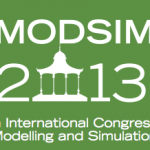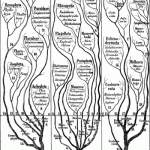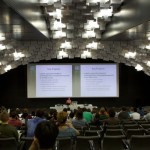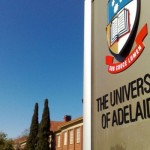The conference will cover techniques from mathematical modeling, data analysis and climate policy, and topics including impact of climate change on vegetation, animal populations, water/ice, carbon, and human health. The speakers will outline open problems and challenges for the future and the audience will have a chance to interact with them in the panel discussion concluding the conference. Continue reading
Category Archives: General
Advances in computational resources from current and planned HPC systems have enabled Earth System models with finer spatial resolution and additional complexity than was supported by past systems. However, obtaining physically accurate yet efficient results requires both new model formulations (e.g. non-hydrostatic equations, realistic process coupling, or complex convection processes) and new methodologies (e.g. machine learning for improving/emulating parameterization schemes or domain specific languages for code refactoring/optimization). These new model approaches and methodologies in turn require new numerical techniques for the discretization of time, physical space, and parameter space to address issues of scalability and data storage on target HPC ecosystems, which include both CPUs and GPUs. This session will present progress on the new modeling approaches, numerical techniques, and data management strategies that will enable the Earth System models of the future. Continue reading
This symposium showcases the final projects from postgraduate students for the AGM-5840 module on mathematical and computational modelling of marine biogeochemical cycles, which is annually offered by INCLINE and IAG-USP. It also features keynote talks given by emerging and world-leading … Continue reading
A rapidly warming climate is leading to widespread melting of ice across the Arctic. At the same time, the volume and complexity of data on ice melting grow rapidly since many new tools (such as remote sensing, high-performance computing, etc.) … Continue reading
The mini-symposium on “Energy Transfers in Atmosphere and Ocean”, originally scheduled to take place at the SIAM Conference on Mathematics of Planet Earth (MPE20), has moved online, following the postponing of MPE20 because of COVID-19. The two parts will take … Continue reading
Graduate students and advanced undergraduates are invited to apply to this online summer program on the mathematics of this critical and timely topic. It will be restricted to US citizens and permanent residents and there will be stipend of $6,000 … Continue reading
How do meteorologists forecast the weather and climate? Is there a way to predict the profit from a wind farm? These are some of the questions modern science addresses by using data assimilation. Many research institutes and companies (e.g. KNMI, Shell, US-NCAR or UK MetOffice) develop and employ data assimilation and the demand for trained personnel is constantly growing. The school will describe the theoretical foundation of data assimilation together with numerical tutorials, all the way to state-of-the-art methods, including modern machine learning approaches and their combination with data assimilation.
Data assimilation is the science of combining measurement data and computational models. It encompasses a large portfolio of methods at the crossroad between numerical analysis, linear algebra, statistics, dynamical systems and optimal control. Data assimilation is crucial in all circumstances where one wishes to make sense of a model against data and is therefore ubiquitous in science and in real life applications.
The summer school aims at covering the mathematical foundations of data assimilation and at describing the existing methods up to the advanced approaches currently being developed. In particular, the school will address variational and ensemble methods, nonlinear Bayesian techniques for high-dimensional systems and the modern hybrid approaches emerging from the cross-fertilization of data assimilation and machine learning. Continue reading
Taking inspiration from the Mathematics of Planet Earth 2013 initiative, this session aims at bringing together contributions from the growing interface between the geophysical, the mathematical, and the theoretical physical communities. Specific topics include: PDEs, numerical methods, extreme events, statistical mechanics, (random and non-autonomous ) dynamical systems, large deviation theory, response theory, tipping points, model reduction techniques, coarse graining, stochastic processes, parametrizations, data assimilation, and thermodynamics. We invite talks and poster both related to specific applications as well as more speculative and theoretical investigations. We particularly encourage early career researchers to present their interdisciplinary work in this session. Continue reading
This Session will bring together experts from the GFD & MPE community working across multiple scales and methods Continue reading
Computational Methods in Water Resources (CMWR) is a series of biannual conferences which, since 1976, alternate between locations in North America and Europe. CMWR is dedicated to nurturing and promotion of cutting-edge interdisciplinary research on quantitative forecasting of hydrological processes, with a special emphasis on mathematical, computational, and statistical methods. Continue reading
The theme of the LMS-IMA Joint Meeting is Mathematics of Planet Earth. Following the international programme MPE2013, the research agenda of Mathematics of Planet Earth has gained more and more relevance within Mathematics as well as at the interface(s) between … Continue reading
Coastal hazards related to strong storms are one of the most frequently recurring and wide spread hazards to coastal communities today and in the future. These flooding hazards include storm surge, wind-waves and extreme precipitation all of which are predicted … Continue reading
Advances in HPC resources have pushed the resolution of Earth System Models to length scales unattainable until now. However, obtaining physically accurate results in an efficient manner at these scales requires more than just increasing the number of grid cells. … Continue reading
The workshop will focus on listing some problems worth solving and some transformative opportunities that can lead to systems change for addressing climate change, biodiversity erosion and global sustainability more broadly. Continue reading
The British Antarctic Survey and the University of Cambridge are hosting a 2 day (lunch-to-lunch) workshop on Machine Learning for Environmental Sciences, to be held at the British Antarctic Survey on Monday 17th to Tuesday 18th June. This conference follows … Continue reading
Main Lecture Courses Random Vortex Methods for 3D Fluids Hakima Bessaih (University of Wyoming) Mathematical Theory of Data Assimilation with Applications Alberto Carrassi (NERSC, Norway) Variational Principles for Stochastic Fluid Dynamics Darryl Holm (Imperial College, London) Guest Lectures Mathematical Aspects … Continue reading
This program, sponsored by AIM and the NSF, seeks graduate and undergraduate students for the Mathematics and Climate Research Network summer school and academic year engagement program. This program begins with a summer school in July, 2019 and continues with … Continue reading
The conference will have an “Optimization Applications in Mathematics of Planet Earth” cluster. Continue reading
To avoid the worst consequences of climate change, the energy chain of the global economy must be drastically decarbonized. This exploratory workshop will build a greater dialogue between those in the mathematical sciences and the clean energy sector. The workshop … Continue reading
The Mathematical Biosciences Institute (MBI) will host a multi-institution REU program in the mathematical biosciences, administered by MBI from the campus of The Ohio State University. REU participants will work on projects in areas such as molecular evolution, neuronal oscillatory … Continue reading
The theme topics for this summer school include
1. Scientific Machine Learning for Geoscience Applications;
2. Nonnegative Tensor Factorization for Machine Learning;
3. Machine Learning for Analyzing Scientific Images;
4. Active Learning Applied to Fluid Flow in Nanoscale Porous Media. Continue reading
The school will bring together experts in physics, mathematics, and (geo)physical fluid dynamics providing participants with scientific knowledge across disciplinary boundaries, leading them towards the many open problems in geophysical fluid dynamics, where new tools, theories and ideas are needed in order to advance substantially our understanding of weather, ocean and climate as a whole on different spatial and temporal scales. Continue reading
Planetary challenges such as climate change, ecological shifts, and sustainable living are pressing societal needs of our times. Some of these challenges are already being addressed with sophisticated mathematical tools, others appear to be ripe for stronger mathematical involvement. What … Continue reading
Emerging infectious diseases (EIDs) are responsible for a significant burden of morbidity and mortality across the globe, and they directly threaten human health security. Across many parts of the United States, for example, a diversity of potentially debilitating tick-borne infections … Continue reading
The elevated temperature in urban areas as compared to less developed areas is referred to as the urban heat island effect (UHI). According to the EPA, many U.S. cities have air temperatures up to 22°F (12°C) warmer than the surrounding … Continue reading
This workshop is the culmination of MPE2013+. It includes presentations by many of the leaders of earlier activities in MPE2013+ as by selected experts in topics of the Mathematics of Planet Earth. It will address and raise key questions in the six main themes of MPE2013+: Global Change, Sustainable Human Environments, Natural Disasters, Management of Natural Resources, Data-aware Energy Use, and Education for the Planet Earth of Tomorrow. There will also be a poster session with posters in any of the six theme areas. Some time will be devoted to discussion of where to take the MPE effort next after MPE2013+ ends. Continue reading
From the point of view of societal impacts, climate change remains one of the most pressing issues of our time. The fifth report of the Intergovernmental Panel on Climate Change (IPCC) included stronger statements than ever before about the likelihood … Continue reading
Energy companies witness a rapidly changing landscape: increase of intermittent, variable and spatially distributed power sources (wind, sun); expansion of markets and actors at all spatial and temporal scales; penetration of telecom technologies (smart grids). Those new factors impact the … Continue reading
Energy companies witness a rapidly changing landscape: increase of intermittent, variable and spatially distributed power sources (wind, sun); expansion of markets and actors at all spatial and temporal scales; penetration of telecom technologies (smart grids). Those new factors impact the … Continue reading
Energy companies witness a rapidly changing landscape: increase of intermittent, variable and spatially distributed power sources (wind, sun); expansion of markets and actors at all spatial and temporal scales; penetration of telecom technologies (smart grids). These new factors impact the … Continue reading
Energy companies witness a rapidly changing landscape: increase of intermittent, variable and spatially distributed power sources (wind, sun); expansion of markets and actors at all spatial and temporal scales; penetration of telecom technologies (smart grids). These new factors impact the … Continue reading
Energy companies witness a rapidly changing landscape: increase of intermittent, variable and spatially distributed power sources (wind, sun); expansion of markets and actors at all spatial and temporal scales; penetration of telecom technologies (smart grids). These new factors impact the practice of optimization.
SESO 2018 will be devoted to stochastic optimization, decentralized optimization and their applications to the management of new energy systems. The Week alternates courses, tutorials, scientific workshops and an industry day; it is aimed at a mixed public, in academy and in industry.
This Mathematics of Planet Earth 2013+ (MPE2013+) workshop will expose faculty teaching undergraduates to current applications of mathematical and computational sciences and provide an opportunity for government or industry professionals to learn about recent research in related areas. The topic will be presented over the course of 3.5 days in series of lectures and activities; participants will be involved in research activities that they and their students can continue with after the workshop. Continue reading
Taking inspiration from the Mathematics of Planet Earth 2013 initiative, this sessions aims at bringing together contributions from the growing interface between the geophysical, the mathematical, and the theoretical physical communities. We invite talks and poster both related to specific … Continue reading
The Applied Machine Learning Summer Research Fellowship is an intense 10 week program aimed at providing graduate students with a solid foundation in modern machine learning through applications of importance to the National Lab. Projects include developing methodologies to address … Continue reading
The objective of this workshop is to explore opportunities for applied mathematicians and computational scientists to develop and analyze mathematical models of food systems. Here, `food system’ refers to the entire set of activities by which calories and nutrients are … Continue reading
Exact Dates TBA (tentative-July 2017) Workshop Announcement Over the last few decades, many large carnivore species have undergone drastic declines. This is especially true for cheetahs and leopards, which have seen range reductions of approximately 83% and 61%, respectively. To … Continue reading
Workshop Announcement The symposium is a three-day (June 14-16, 2017) STEM workshop for teachers and administrators from K-12 institutions, college and university professors of pre-service teachers, and community and business leaders who want to support high-quality STEM education in their … Continue reading
Workshop Announcement Background: Advances in computing technology and the increasing interdisciplinarity of research have all encouraged the development of landscape-scale mechanistic models of coupled ecological-geophysical systems. There has been little consensus, however on the strategies and goals for these models. … Continue reading
Workshop Announcement Please join collaborating scientists from UC Berkeley and Rutgers University for a day-long modeling symposium related to the Zika virus. Enjoy presentations from leading researchers across the country as they discuss their latest research.
Workshop Announcement There are a variety of natural and man-made disasters involving material transport that impact society. The spread of an oil spill or radioactive material in the ocean or atmosphere are examples. In order to improve emergency response, we … Continue reading
The aim of this workshop is to foster collaboration among individuals interested in improving PK-12, undergraduate, and graduate STEM Education. The broad disciplinary focus is the Management of Natural Resources, which includes challenges affecting food supplies, forests, and water. Many … Continue reading
Workshop Announcement The issues facing the planet call for a new type of workforce, trained in multidisciplinary and multi-national communication and collaboration. To function in this rapidly changing world, math students will need to appreciate the most important concepts at … Continue reading
Global change and rising pressure on the environment are having increasingly visible impacts on the sustainability of human activities. For example, heat waves seem to be more and more frequent. It is essential to be able to forecast the likely size and impact of these and other extreme events such as droughts and major windstorms if we are to adapt to them and attempt to mitigate their future effects. Continue reading
This international, interdisciplinary, educational and capacity building
workshop will bring together the two subjects of infectious diseases and
invasive species and the context of climate change, thus allowing sharing the
methods and building partnerships. The workshop will address the whole range of
topics from field-work and collecting of data to the building and validating of
models, to the adjustment of models to take into account the changing
environment and the social characteristics, and to the design and implementation
of strategies to fight infectious diseases and invasive species. Special
emphasis will be put on African diseases and invasive species, as well as the
characteristics of changing environment in Africa.
Videos of the lectures can be found at Videos of Workshop GCI
Workshop Announcement The issues facing the planet call for a new type of workforce, trained in multidisciplinary and multi-national communication and collaboration. To function in this rapidly changing world, math students will need to appreciate the most important concepts at … Continue reading
Workshop Announcement This workshop will introduce participants to the MPE2013+ activity by preparing them to participate in the workshops (research and education) that we will run. The participants will be graduate students, postdocs, and junior faculty, with an emphasis on … Continue reading
14-18th July 2014, University of Leeds, UK The CliMathNet EARLY BIRD REGISTRATION DEADLINE IS 8TH JUNE 2014 ABSTRACTS ARE INVITED BY 31ST MAY 2014 The registration fee £150 for CliMathNet members includes lunch and refreshments on each day of the … Continue reading
he ARC Centre of Excellence for Climate System Science will host its 3rd annual winter school on June 16-20, 2014 in the Research School of Earth Sciences at the Australian National University. The 2014 winter school theme is Geophysical Fluid Dynamics. … Continue reading
Workshop Announcement To maintain the long-term well-being of the global population, management of the world’s natural resources must emphasize conservation and renewal over depletion and spending. Natural resource management is a broad topic with both national and international policy implications. … Continue reading
Workshop Announcement No part of the world is impervious to natural disaster. Epidemics, earthquakes, floods, hurricanes, drought, tornadoes, wildfires, tsunamis, and extreme temperatures routinely take their toll. Mathematical sciences can help in predicting, monitoring, and responding to such events, and … Continue reading
Workshop Announcement We need to make good choices about today’s energy investments, because they will be with us for a long time. Data can help us make better choices if we can surmount concomitant challenges: massive amounts of data; incomplete, … Continue reading
Workshop Announcement The planet is constantly changing, but the pace of change has accelerated as a result of human activity. Construction and deforestation change habitats; fishing affects fish populations; fossil fuel combustion leads to atmospheric greenhouse gas buildup; commerce and … Continue reading
Workshop Announcement In 1900 only 13% of the world’s population lived in cities but by 2050 that number will have risen to 70%. Rapidly growing urban environments present new and evolving challenges: growing needs for energy and water, impacts on … Continue reading
An international conference on “Mathematical Modelling for Tsunami Early Warning Systems” will be held in Málaga, Spain, April 9-11, 2014. The conference is a joint activity of the University of Málaga (UMA), the Mathematics-Industry Spanish Network (MATH-IN) and the Spanish Society of Applied Mathematics (SEMA).
Continue reading
The 3rd International Conference Dynamics Games and Science 2014 – DGS
III 2014, aims to bring together world top researchers and
practitioners from the fields of Dynamical Systems, Game Theory and
its applications to such areas as Biology, Economics and Social
Sciences.
Continue reading
Abstract We argue that supply risks, a major energy security indicator, should be considered in addition to previously-proposed metrics for evaluating the performance and scalability potential of transportation biofuels. Biofuels rely on agricultural production as their key input, which is … Continue reading
Abstract: Ces défis s’appellent: (i) “modélisation collaborative”; (ii) “gestion du risque”; (iii) “action et réaction des agents”; (iv) analyse de décision robuste; (v) émulation statistique et meta-modelling. À travers quelques exemples de développements récents dans le cadre du projet Européen ERMITAGE, … Continue reading
Résumé IFP Énergies nouvelles est un institut de recherche public français dans le domaine de l’énergie et des transports. L’objet de cette intervention est de présenter un panorama des travaux d’études et de recherches de l’institut en matière de prospective … Continue reading
Abstract In this talk, we discuss recent efforts in developing analytics for estimating the potential short-term (i.e. intra-hour) reserve capacity that could be offered by a large number of controllable thermostatic loads (TCLs) through demand-side flexibility aggregators. TCLs include all types … Continue reading
Modern laser technology allows the generation of ultrafast (few cycle) laser pulses, with intensities exceeding the internal electric field in atoms and molecules, E = 5×109 V/cm, equivalent to the intensity I = 3.5×1016 Watts/cm2. The interaction of such pulses with atoms … Continue reading

This workshop is on recent and future advances in the analysis, computation and application of random matrices. Random matrix theory is an active and vibrant field with exciting recent theoretical developments in universality, and deep connections with many different areas … Continue reading

Public Lecture presented by Professor Stephen Donnellan Some of the big questions in evolution of life on earth, such as how did life begin, why did sex evolve, how do species form, are starting to be unravelled by the availability of … Continue reading

This workshop is aimed at sharing ideas and discussion of recent results in Complex analysis and differential geometry. Over the four days, the workshop will focus on para-complex notions and results of Kähler and CR-geometry and their applications in fluid … Continue reading

We are pleased to announce that the 20th International Congress on Modelling and Simulation (MODSIM2013) will be held at the Adelaide Convention Centre in Adelaide, South Australia, from Sunday 1 to Friday 6 December 2013. ASOR (the Australian Society for Operations Research) and … Continue reading

This conference is a major event in the 2013 ANU special year on nonlinear partial differential equations. We focus on new developments in several themes of nonlinear PDEs and their applications, which include variational theory of nonlinear equations arising in … Continue reading

The Australia-China Workshop on Optimization was first initiated and organised by Prof. Alex Rubinov in 2004. This workshop series has been successfully held for 5 times in China and Australia and the next one will be held during 28-30 November … Continue reading

Lighthouse DELTA 2013 builds on the knowledge and collegial networks established in previous Delta conferences, a series of biennial southern hemisphere symposia that began in Brisbane in 1997. Delta attracts a wide international audience of mathematicians, educators and researchers committed … Continue reading

Ever since the publication of Origin of the Species, biologists have aimed to uncover the evolutionary history of the species that inhabit (or once inhabited) the Earth – this project has come to be known as the Tree of Life. … Continue reading

Phylogenetics is concerned with the problem of reconstructing the past evolutionary history of organisms from molecular data, such as DNA, or morphological characters. There is ongoing interest in the further development of the mathematics that underlies computational phylogenetic methods. Hidden … Continue reading

APPLICATIONS ARE NOW OPEN The AMSI Summer School is an exciting opportunity for mathematical sciences students from around Australia to come together over the summer break and develop their skills and networks. Over the four weeks students take innovative courses … Continue reading

BioInfoSummer is a major annual bioinformatics educational and outreach event in Australia, bringing together in excess of 150 biologists, statisticians and bioinformatics professionals. Bioinformatics creates biological information and knowledge by the acquisition, archiving, integration, analysis and interpretation of biological data. … Continue reading
In the international year of Mathematics of Planet Earth, with this meeting we want to display some examples of Applied Mathematics inside the context of Geophysics. At this meeting we will show different examples by using partial differential equations models. … Continue reading
Genes are transmitted randomly: this is why probability, a branch of mathematics, is used to model evolution within species. The lecture will give a non-technical overview of some models and explain the two-way interaction between mathematics and population genetics. Starting with the famous model of Wright-Fisher in the 1930’s, it will move to the revolutionary way of looking at evolution introduced by Kingman in 1982: instead of looking forward in time, we look backward! DNA data became available in the last decades and statistics now plays a crucial role in determining the ancestral trees back in time. A stunning application is the identification of hotspots of recombination, where chromosomes are more likely to break on reproduction. Continue reading
On November 12, 13 and 15, we are organizing the so-called Biomath days to which we invite students from the third grade of secondary school. On each of these days, the participating students will get in touch with the world … Continue reading
Workshop Announcement The workshop will investigate sustainable human environments through an emphasis on urban planning for climate events such as storms, heat events, and floods. We will look at algorithmic tools to make better decisions about adaptation and mitigation for … Continue reading
The Swedish National Committee for Mathematics arranges a free of charge public symposium in Stockholm, November 9th, 2013. The talks, given in Swedish, have titles that can be translated to:”So do numerical models for weather- and climate-forecasts work” , “Even living … Continue reading
The objective of the session is to encourage research in
identifying and solving fundamental questions about the Planet Earth. Mathematics, statistics, and mechanics are essential tools in
geosciences. Mathematical methods play a defining role in solving
dynamical geophysical processes in the Earth interior, oceans and
atmosphere that determine our climate, weather, natural hazards,
water, and energy resources. The challenges facing our planet and our
civilization are multidisciplinary and multifaceted, and the
mathematical sciences play a central role in the global effort to
understand and to deal with these challenges. Continue reading
À l’aide d’exemples, la conférence va illustrer le rôle peut-être trop méconnu des mathématiques dans l’exploration et la compréhension de notre planète, et des défis pour tenter de la protéger. Continue reading
This workshop brings together mathematicians and statisticians, whose research expertise is relevant to investigating threshold behaviour in complex environmental systems, with the climate scientists and ecologists who exploit mathematical modelling in their research on tipping phenomena.
International Centre for Theoretical Sciences (ICTS) of Tata Institute of Fundamental Research (TIFR) is planning “Mathematics of Planet Earth” (MPE) exhibition during Fri. 22nd November – Sat. 1st of December 2013 (10 days) in Bangalore, India. Our goal is to raise … Continue reading
Watch the video of Dr. Nowak’s lecture Abstract During his upcoming Public Lecture, evolutionary biologist Martin Nowak, author of the best-selling book SuperCooperators, will share his cutting-edge research on the mysteries of cooperation. According to Nowak, many problems that challenge … Continue reading
Shape Sleuths for Farm Machinery Developments
Shape Sleuths for (Australian 20th C) Farm Machinery Developments (from enviroed4all in Australia) Domains: Mathematics, Science, History, English, Communication Year levels : primary focus – middle and upper mainly, but can be used with lower Have you ever considered the … Continue reading
Watch the video of Dr. Carter’s lecture Abstract An alarming milestone was reached this past spring: the amount of carbon dioxide in the atmosphere exceeded 400 ppm for the first time in human history. The reason is clear: humans have … Continue reading
Earth is a complex planet inside the solar system, with dynamic movements in the mantle, an atmosphere, and oceans. It supports life and is organized by humans. More recently the future of life is threatened by climate change and overexploitation of resources. Mathematics provides tools to discover the history of the Earth, explore its interior, study its climate, and understand its ecosystems. The lecture will highlight with examples the role of mathematics in discovering, understanding our planet, and the challenges to help protecting it. Continue reading
Abstract: When Columbus left Spain in 1492, sailing west, he knew that the Earth was round and was expecting to land in Japan. Seventeen centuries earlier, around 200 BC, Eratosthenes had shown that its circumference was 40,000 km, just by … Continue reading
Ivar Ekeland, Université Paris-Dauphine, will deliver a two-part lecture entitled, ” Mathematics and the Planet Earth: a Long Life Together.” The lecture will take place on July 15 and 17, 2013 at The University of British Columbia. Abstract: When Columbus … Continue reading
The past decades have witnessed a steady increase of worldwide crude oil demand, which, in return resulted in new developments in hydrocarbon exploration and geophysical inversion methods. However a variety of issues in seismic inversion still remain unsolved, especially in … Continue reading
Watch the video of Dr. Mahadevan’s lecture Abstract The diversity of living forms led Darwin to state that it is “enough to drive the sanest man mad”. How can we describe this variety? How can we understand the origin and … Continue reading
The term “tipping point” describes the moment when a system suddenly changes state, with no obvious trigger other than a slowly changing environment. Tipping points are difficult to predict and difficult to reverse. Examples range from capsizing boats to fishery … Continue reading
Abstract: This talk is the story of an encounter of three distinct fields: non-Euclidean geometry, gas dynamics and economics. Some of the most fundamental mathematical tools behind these theories appear to have a close connection, which was revealed around the … Continue reading
Program: -Tomás Alarcón (Centre de Recerca Matematica, Barcelona, Spain): An Introduction to Stochastic Methods in Mathematical Biology -Mario Primicerio (Dipartimento di Matematica “Ulisse Dini”, Università degli Studi di Firenze, Italy): Mathematical Models for Social Changes and Criminology -Koby Rubinstein (Department … Continue reading
Program: – Jordi Bascompte (Integrative Ecology Group, Estación Biológica de Doñana, CSIC, Spain): The Mathematics of Biodiversity – Nicola Bellomo (Politecnico di Torino, Torino, Italy): Towars a Theory of Complex Living Beings – Joel Brown (UIC Biological Sciences, University of … Continue reading
Prof. Dr. Rupert Klein of Freie Universität Berlin delivers the sixth in the MPE2013 Simons Public Lecture series. Watch the video of Prof. Dr. Klein’s lecture Abstract Several illustrative examples will elucidate typical mathematical contributions to climate research which, by … Continue reading
http://homepages.gac.edu/~hvidsten/MAASeminar/
The primary objective of this workshop is to continue the current effort in mathematical immunology that has been initiated by a series of international meetings. The second objective of the workshop is to enhance and train the strong mathematical immunology … Continue reading
The aim of this workshop is to bring experts in probability, information theory, and stochastic systems alongside experimental systems biologists to develop understanding of the principles underlying cellular signalling and decision-making, and to develop quantitative techniques to investigate those principles … Continue reading
How would you control the outbreak of a deadly infectious disease? What would you prioritise – developing a vaccine; isolating the sick; closing borders? In this interactive event using reports from the 2003 SARS outbreak and swine flu pandemic of … Continue reading
Abstract: ” Grâce aux mathématiques, nous avons su que la Terre est une planète, c’est-à-dire un globe suspendu dans un espace infini, bien avant de lancer des satellites artificiels: quand Christophe Colomb quitte Palos de Moguer en 1492, pour atteindre … Continue reading
Teach Networks to Teenagers
This is an article about outreach efforts to teach networks to students of age 13-16 in England. Supplementary teaching materials are available, too. Link to the abstract and article Download supplementary materials (.zip file)
Internationally, the increasing demand for accurate high-impact weather and Earth-system (hydrology, chemistry, land, ocean, sea-ice …) predictions is indisputable. It has led to significant investment in sophisticated applied mathematical algorithms and studies, high performance computing, high-speed telecommunication, remote sensing, ground-, … Continue reading
The main goal is to provide a multidisciplinary forum where Mathematicians and Engineers can engage and discuss the development of innovative scientific and technological tools for the study and exploration of the Earth and the Ocean, with special emphasis on Marine problems. Besides promoting demonstrations and discussions of recent advances in hot topics of research, the conference is expected to foster a tighter cooperation between theoretical and experimental practitioners leading to the emergence of new research agendas and providing guidelines for future work.
Continue reading
Kafemath le jeudi 14 mars 2013 à 20 heures à “La Coulée Douce“, 51 rue du Sahel, Paris 12 ième. par Sylvie Joussaume, directrice de Recherche au CNRS, Institut Pierre-Simon Laplace. Résumé d’auteur. “Les observations mettent en évidence un … Continue reading
Organisée par le Muséum Henri-Lecoq et l’IREM de Clermont-Ferrand, la soirée “Un voyage sur la math-monde” vous invite à découvrir la planète Terre à travers l’histoire des mathématiques et des instruments de calcul. C’est aussi l’occasion de voir notre quotidien et notre planète à travers l’œil du mathématicien. Continue reading
AMSI MPE Schools Resources
The Australian Mathematical Sciences Institute has a number of self-contained classroom resources based on topical issues and current events. For each there is a brief background and some mathematical questions for students. Link to the AMSI MPE Resources
The second Workshop of the HPC-GA Project will be held in the Basque Center for Applied Mathematics, in March, 11 – 15, 2013 in Bilbao. The workshop will bring together researchers involved in the large-scale simulation of geophysics phenomenon. The … Continue reading
Environmental Mathematics Day This workshop presents some contributions of the applied mathematics to the analysis of the behaviour of environmental systems. It addresses quite different systems: Hydrodynamic flows, glaciers, fisheries and forest fires. Our purpose is to show how applied mathematics can provide … Continue reading
BCAM-Basque Center of Applied Mathematics, in collaboration with the Chair of Scientific Culture of the University of the Basque Country and the Alliance of Technological Centers IK4, invite you to the public lecture M4TEMOZIOA Matematikaren Hitzordua I Cita con las … Continue reading
AMMCS-2013 is an interdisciplinary international conference in a series of AMMCS meetings held in Waterloo, Ontario, Canada. The series aims at promoting interdisciplinary research and collaboration involving mathematical and computational sciences, and highlighting recent advances in Applied Mathematics, Modeling and … Continue reading
Earth is a complex planet inside the solar system, with dynamic movements in the mantle, an atmosphere, and oceans. It supports life and is organized by humans. More recently the future of life is threatened by climate change and overexploitation of resources. Mathematics provides tools to discover the history of the Earth, explore its interior, study its climate, and understand its ecosystems. The lecture will highlight with examples the role of mathematics in discovering, understanding our planet, and the challenges to help protecting it. Continue reading
Rydges Hotel, Melbourne 8-12 July 2013 An Australian Academy of Science Elizabeth and Frederick White Conference This conference is the central scientific event of MPE Australia 2013, bringing together the scientific community to address the mathematical contribution to the challenges of … Continue reading
Watch the video of Dr. Dominici’s lecture Abstract Over the next century, climate change is expected to lead to an increase in the intensity and frequency of extreme weather events such as heat waves. Climate change is also expected to impact … Continue reading
Watch the video of Dr. Daubechies’ lecture (English) Watch the video of Dr. Daubechies’ lecture (French) Résumé Qu’ont en commun l’analyse d’images, les tremblements de terre et les panaches volcaniques? Non, cette devinette n’est pas une blague! C’est l’histoire d’une mathématicienne … Continue reading
Victor Donnay: Ordinary Differential Equations in Real World Situations
This course for junior and senior math majors uses mathematics from ordinary differential equations, to analyze and understand a variety of real-world problems. Among the civic problems explored are specific instances of population growth and over-population, over-use of natural resources … Continue reading
The Finnish Inverse Problems Society coordinates a wealth of activity in inverse problems research in the fields of mathematics, physics, computer science and astronomy. One of the major funding sources is our Finnish Centre of Excellence in Inverse Problems Research … Continue reading
Publications de l’ADIREM
Liste des publications de l’ADIREM.
CliMathNet Conference 2013 Continue reading
Le 24 heures de science, c’est une fête des sciences et des technologies. Une foule d’activités qui se tiennent partout au Québec sur 24 heures, du vendredi 10 mai 2013 à midi jusqu’au samedi 11 mai à la même heure. … Continue reading

IIASA’s annual 3-month Young Scientists Summer Program (YSSP) offers research opportunities to talented young researchers whose interests correspond with IIASA’s ongoing research on issues of global environmental, economic and social change. From June through August accepted participants work within the … Continue reading
Creating usable models for the sustainability of ecosystems has many mathematical challenges. Ecosystems are complex because they involve multiple interactions among organisms and between organisms and the physical environment, at multiple spatial and temporal scales, and with multiple feedback loops … Continue reading
The main goal of the Symposium is to serve as a forum for presentation of ongoing research on the mathematics of population. The program will encompass research on human and non-human populations, and both theoretical and applied research. In bringing … Continue reading
The sessions are Thursday January 10, 2013, 1:00 p.m.-3:45 p.m., Friday January 11, 2013, 8:00 a.m.-10:45 a.m. and Saturday January 12, 2013, 1:00 p.m.-5:20 p.m. All three sessions are in Room 17B, Mezzanine Level, of the San Diego Convention Center. … Continue reading
The session is Wednesday January 9, 2013, 9:30 a.m.-10:45 a.m. in Room 6C, Upper Level, of the San Diego Convention Center.
The sessions are Thursday January 10, 2013, 8:00 a.m.-11:40 a.m. and 1:00 p.m.-3:45 p.m. Both are in Room 6C, Upper Level, of the San Diego Convention Center.
The session is Friday January 11, 2013, 1:00 p.m.-5:50 p.m. in Room 17A, Mezzanine Level, of the San Diego Convention Center.
The sessions are Thursday January 10, 2013, 8:00 a.m.-11:50 a.m. and Saturday January 12, 2013, 8:00 a.m.-10:50 a.m. Both are in Room 9, Upper Level, of the San Diego Convention Center.
The sessions are Friday January 11, 2013, from 8:00 a.m.-10:50 a.m. and from 1:00 p.m.-5:50 p.m. Both are in Room 30D, Upper Level, of the San Diego Convention Center.
The sessions are Thursday January 10, 2013, 8:00 a.m.-11:50 a.m and Saturday January 12, 2013, 8:00 a.m.-10:50 a.m. Both sessions are in Room 17B, Mezzanine Level, of the San Diego Convention Center.
The sessions are Wednesday January 9, 2013, 2:15 p.m.-6:35 p.m. and Friday January 11, 2013, 9:00 a.m.-10:50 a.m. both in Room 9, Upper Level, San Diego Convention Center.
The Saturday morning session runs from 8:00 AM to 10:50; the afternoon session is from 1:00 to 5:50. The talks are in Room 30C, Upper Level, San Diego Convention Center.
Organizers Thomas Bellsky Arizona State University Jesse Berwald College of William and Mary Lewis Mitchell University of Vermont Description A major question facing climate modeling is how best to incorporate data into models. As climate models increase in complexity, their … Continue reading
Organizers: Jinqiao Duan Institute for Pure and Applied Mathematics, University of California Andrew J. Majda Courant Institute of Mathematical Sciences, New York University Ray Pierrehumbert Department of the Geophysical Sciences, University of Chicago Xiaoming Wang Department of Mathematics, Florida State … Continue reading
Tom Pfaff’s Sustainability Materials for Mathematics
Materials are available for mathematics courses (mostly Calculus I, Statistics, & Differential Equations) covering a variety of sustainability related topics. Tom Pfaff’s Sustainability Materials Sustainability Math Resources Website
Large scale production of very heavy oil is gaining momentum because of the decline of easy to produce reservoirs, the increasing oil demand and subsequent rising oil price, which makes such resources more economical. Considering the pressure on the oil market … Continue reading
In this public lecture, Jane Wang will explore the connection between two themes: 1. Understanding nature’s solutions to the Navier-Stokes (fluid dynamics) equations for locomotion 2. Understanding our own response to the poetic movement of falling and flying objects. The … Continue reading
La Terre est une planète complexe, avec une atmosphère, des océans et des climats. Nous partageons la planète avec des millions d’espèces animales et végétales, envahissantes ou menacées. Quel lien avec les mathématiques ? Vous serez étonnés de voir la … Continue reading
Internationally, the increasing demand for accurate high-impact weather and Earth-system (hydrology, chemistry, land, ocean, sea-ice …) predictions is indisputable. It has led to significant investment in sophisticated applied mathematical algorithms and studies, high performance computing, high-speed telecommunication, remote sensing, ground-, … Continue reading
We all Google. You may even have found this talk by Googling. What you may not know is that behind the Google’s and other search engines is beautiful and elegant mathematics. In this talk, I will try to explain the … Continue reading
There is an extensive applied mathematics literature developed for problems in the biological and physical sciences. Our understanding of social science problems from a mathematical standpoint is less developed, but also presents some very interesting problems. This lecture uses crime as a case study … Continue reading
“Fracking” is used by the oil and gas industry to enhance the production of hydrocarbons. Recently there has been considerable controversy surrounding the fracking process due to environmental concerns. Fracking makes use of a process called hydraulic fracturing (HF) by … Continue reading
The Fields Institute presents a public talk by Canadian economist Darrell Duffie, Dean Witter Distinguished Professor of Finance at Stanford University. His talk will focus on general principles regarding financial infrastructure, the role of central banks, and the choice of … Continue reading
This is part of a series of workshops organized by IMPA aiming at bringing together a multidisciplinary group of scientists to study problems in the biophysical sciences upon which mathematics may have an impact. This year’s main topics are: Inverse … Continue reading
Dynamics, Games and Science II The international conference will have around 10 keynote speakers and 20 thematic sessions with an approximated total of 100 speakers. The keynote speakers are top researchers in mathematics and science whose discoveries had a great … Continue reading
Mathematics of Energy and Climate Change The international conference will have around 10 keynote speakers and 20 thematic sessions with an approximated total of 100 speakers. The keynote speakers are top researchers in mathematics and science whose discoveries had a … Continue reading
Dynamics, Games and Science The international conference will have around 10 keynote speakers and 20 thematic sessions with an approximated total of 100 speakers. The keynote speakers are top researchers in mathematics and science whose discoveries had a great impact … Continue reading
Mathematics of Energy and Climate Change The international conference will have around 10 keynote speakers and 20 thematic sessions with an approximated total of 100 speakers. The keynote speakers are top researchers in mathematics and science whose discoveries had a … Continue reading
We all know something about waves; we’ve seen them in the sea and as ripples on a pond. We know that sound travels to our ears as a wave and that some properties of light can be explained by its … Continue reading
Dynamics, Games and Science The international conference will have around 10 keynote speakers and 20 thematic sessions with an approximated total of 100 speakers. The keynote speakers are top researchers in mathematics and science whose discoveries had a great impact … Continue reading
Mathematics of Energy and Climate Change The international conference will have around 10 keynote speakers and 20 thematic sessions with an approximated total of 100 speakers. The keynote speakers are top researchers in mathematics and science whose discoveries had a … Continue reading
Organizers: Andreas Buchleitner (Freiburg) Florin Diacu (Victoria) Gregor Tanner (Nottingham)
Professor Inez Fung visits South Africa to deliver the third in the international series of MPE2013 Simons Public Lectures. Watch the video of Dr. Fung’s lecture Abstract: Climate models solve the equations for the conservation of momentum, mass, energy, water … Continue reading
CIMAT is holding a 5-day workshop called “6th Industrial Problem Solving Workshop”. This event will take place at CIMAT in Guanajuato, Mexico. The workshop is designed to provide graduate students and qualified advanced undergraduates with firsthand experience in industrial research. … Continue reading
This meeting is being organized as a part of the activities related to the “Mathematics of Planet Earth 2013”. The scientific themes of the Ramanujan Lectures by Prof. Majda will be modelling of wave phenomena in the tropics, study of … Continue reading
ICERM’s Idea-Lab invites 20 postdoctoral researchers to the Institute for Computational and Experimental Research in Mathematics (ICERM) for a week during the summer of 2013. The program will start with brief participant presentations on their research interests in order to build … Continue reading
French research institutes (Cnrs, Inria), mathematical societies (SMF, SMAI, SFDS) and Cap’Math foster MPE2013 and open a new blog specifically devoted to this event: mpt2013.fr. The French blog aims at publishing one text a day (except on week-ends) in connection … Continue reading
MCRN Mathematics and Climate Annotated Reading Lists
MCRN Annotated reading lists: Each reading list is designed to provide an introductory guide to one area of climate science through its literature. They can be used for independent study, or as the foundation for upper division and graduate reading courses. … Continue reading
AMS-ASA-MAA-SIAM Math Awareness Month
April is Math Awareness Month in the US! Check out the essays, posters and related materials for 2013 and previous years‘ themes, including: 2013 – Mathematical and Sustainability 2011 – Unraveling Complex Systems 2009 – Mathematics and Climate 2008 – … Continue reading
DIMACS Sustainability Modules for Core Math Classes
Coming Soon: modules on math and sustainability topics, developed with NSF funding at the Center for Discrete Mathematics and Theoretical Computer Science (DIMACS) in collaboration with the Mathematics and Climate Research Network. Modules are targeted to core curriculum college mathematics … Continue reading
During the conference “Les Journées de la SFdS, Toulouse 2013”, a special session on “Statistics for Planet Earth” will be organized,
The thematic program “Mathematical Biology” will be held in Lyon from March 4th to June 14th, 2013. The main topics to be addressed in this program are: cell biology, population dynamics, quantitative modeling for drug development, systems biology, and evolutionary … Continue reading
During the conference “Les Journées de la SFdS, Toulouse 2013“, a special session of “Les cafés de la statistique“, meant as an introductory conference open to everyone, will be organized.
Abstract: Results from the Energy-Emissions-Economy Model for Canada (E3MC) are used by Environment Canada to produce emissions projections and to analyze environmental and economic impacts of proposed policies and regulations. In this presentation, we would like to present the modelling … Continue reading
Abstract: International energy trading is of vital importance to Canada’s continued economic growth. The uncertainty on Keystone XL and Gateway pipelines will affect the projection of Canadian oil sands export and production. We have been developing a two-stage Stochastic Programming … Continue reading
Abstract: In this talk we try to introduce and explain the concept of Policy Analytics: aiding to decide in designing, implementing and assessing public policies. More precisely we show what is specific in decision support within a policy cycle and … Continue reading
Table Ronde
The new structure of power systems, with decentralized and highly variable production sources (renewable energies like wind or photovoltaic) and consumption sinks (accumulators, transport), challenges optimization methods for their management.
Pierre Carpentier (ENSTA ParisTech), Jean-Philippe Chancelier and Michel De Lara (École des Ponts ParisTech) have been working together for more than ten years at the Optimization and Systems Group at Cermics, the applied mathematics research center of École des Ponts ParisTech. Their central theme of investigation is about numerical methods in stochastic optimization. Their main application is the management of energy systems under uncertainty, in collaboration with industrial partners.
The course will present stochastic control theory, and extensions to more advanced topics, like risk constraints and informational constraints in large-scale systems. Courses will alternate with computer practical works. The main examples will be taken from dam management under uncertainty. However, the practical issues, the general theory and the numerical methods presented can be applied to other uncertain sources of energy (wind, solar) and, more generally, to the management of smart power systems.
The CIRM School Stochastic Control for the Management of Renewable Energies (STOCORE) is hosted by the Centre International de Rencontres Mathématiques (CIRM) at Marseille (South of France) between 8-12 April 2013.
The CIRM School STOCORE is in the realm and continuation of the Institut Henri Poincaré (IHP) trimester MABIES Mathematics of Bio-Economics (2013, January 7 – April 5), organized by Michel De Lara and Luc Doyen, itself a contribution to the Mathematics of Planet Earth – MPE2013 initiative. Continue reading
The aim of the conference is to bring together scientists from three areas as diverse as Earth Sciences of fluid phenomena, Non-equilibrium Statistical Mechanics and the Theory of Extreme Events for dynamical systems. Though they have historically common roots and … Continue reading
This workshop aims to bring together researchers in the field of applied probability from the region and elsewhere. Continue reading
Registrations are now being accepted, please see event website for further information Continue reading
Ecologists and statisticians have much to gain from working together Continue reading
On the ocassion of the MPE 2013, the ICMAT, CSIC, the UAM ,the UCM and the UPM want to highlight the decisive role Mathematics plays in the study of local as well as global issues in Earth Sciences.The following topics … Continue reading
This public lecture is part of the annual meeting of the UK Pure Mathematics
Community, to be held at the University of Sheffield from 25 March to 28 March inclusive. John Baez, founder of the Azimuth Project is a distinguished mathematician and scientist who is now committed to the study of climate change. Continue reading
Topic: The Mathematics Behind Biological Invasions Description: COURSE STRUCTURE The course will be based on three components: lectures, computer labs and group projects. The first two weeks will focus on the lectures and computer labs. Four international Distinguished Lecturers will give … Continue reading
NCTM Curriculum resources for Elementary level, Middle School and High School
The material collected is related to the themes A planet to discover and A planet organized by humans are represented. Continue reading
Within 2013 several scientific activities will be devoted to mathematical researches for the study of planet Earth. The overall organization is called “Mathematics for Planet Earth 2013”, hereafter MPE2013. The topics touched by MPE2013 concern different fields: impacts of dangerous … Continue reading
La conférence aura lieu dans le cadre des 24 heures de science. Elle sera précédée d’animations mathématiques à compter de 18h30 et suivie d’un vin d’honneur. Continue reading
Dr. Emily Shuckburgh, British Antarctic Survey, visited the San Francisco Bay Area for the second MPE2013 Simons Public Lecture. Watch the video of Dr. Shuckburgh’s lecture Abstract: The signs of disruption to our climate are all around us. California has … Continue reading
The program covers state-of-the-art technologies used in medical and biological research and also teaches fundamentals of data analysis. Continue reading

The 11th AMSI Summer School will be hosted by the University of Melbourne from 7 January to 1 February 2013. The School is an exciting opportunity for mathematical sciences students to come together over the summer break and develop their … Continue reading
Watch the video of Dr. Levin’s lecture Professor Simon Levin, Princeton University, visits Australia to deliver the first in the international series of MPE2013 Simons Public Lectures. Abstract: The continual increase in the human population, magnified by increasing percapita demands … Continue reading
The aim of the Women in Mathematics summer school is to provide a stimulating intellectual environment for PhD students and post-docs from different countries and different mathematical disciplines. It is the fifth of a series intiated by European Women in … Continue reading
This four month programme shall advance the mathematical modelling and analysis of complex fluids and active media in situations involving interface and contact line dynamics. It is focused on confined systems involving various kinds of interfaces as, for instance, moving … Continue reading
Optimisation problems involving polynomials arise in a wide variety of contexts, including operational research, statistics, probability, finance, computer science, structural engineering, statistical physics, combinatorial chemistry, computational biology and algorithmic graph theory. They are however extremely challenging to solve, both in … Continue reading
Quantum information is currently one of the most dynamic and exciting areas of science and technology. Its breadth of significance ranges from deep fundamental issues of the ultimate physical limits of information processing and foundations of quantum mechanics, to the … Continue reading
Geomathematics is an emerging new scientific area. Its increasing importance is due to visionary scientists such as Willi Freeden, whose 65th birthday is celebrated by this conference. This workshop is dedicated to the interdisciplinary research of mathematicians and geoscientists and contributes to the international year “Mathematics of Planet Earth 2013”. It provides a platform for scientists working in the intersection of mathematics and the geosciences to present and discuss novel solutions and open problems. Besides the invited lectures, contributed talks, in particular also by junior scientists, from all areas of the interface of mathematics and the geosciences are welcome. Continue reading
The conference theme is: FRONTIERS OF MATHEMATICAL GEOSCIENCES: NEW APPROACHES TO UNDERSTAND THE NATURAL WORLD. There will be a student poster award.
One of the topics of the Conference is “Mathematics of Planet Earth” (see Timetable).
The 2012 meeting of the Canadian Mathematical Society is the Canadian launch of MPE2013. The meeting Director is Luc Vinet. There will be two public lectures related to MPE2013 By Ivar Ekeland (in French) and Doyne Farmer (English), plenary lectures … Continue reading
The objectives of this workshop are:
(1) to bring together researchers to address emerging issues in non-Gaussian
multivariate statistical models and their application;
(2) to promote interactions and collaborations among researchers in Canada and around the world on two specific lines of research, namely multivariate skew-symmetric distributions and copula models;
(3) to explore the combination of multivariate skew-symmetric distributions and copulas to obtain tractable models with tail dependence and reflection tail asymmetry;
(4) to discuss ideas and future directions for developing realistic and useful non-Gaussian statistical models, with emphasis on their applications;
(5) to provide opportunities for graduate students and recent Ph.D. recipients to meet and interact with leading researchers in the area.
Continue reading
The inaugural Mathematical Congress of the Americas (MCA) will take place in Guanajuato, Mexico, August 5-9, 2013. The goal of the Congress is to highlight the excellence of mathematical achievements in the Americas within the context of the international arena, … Continue reading